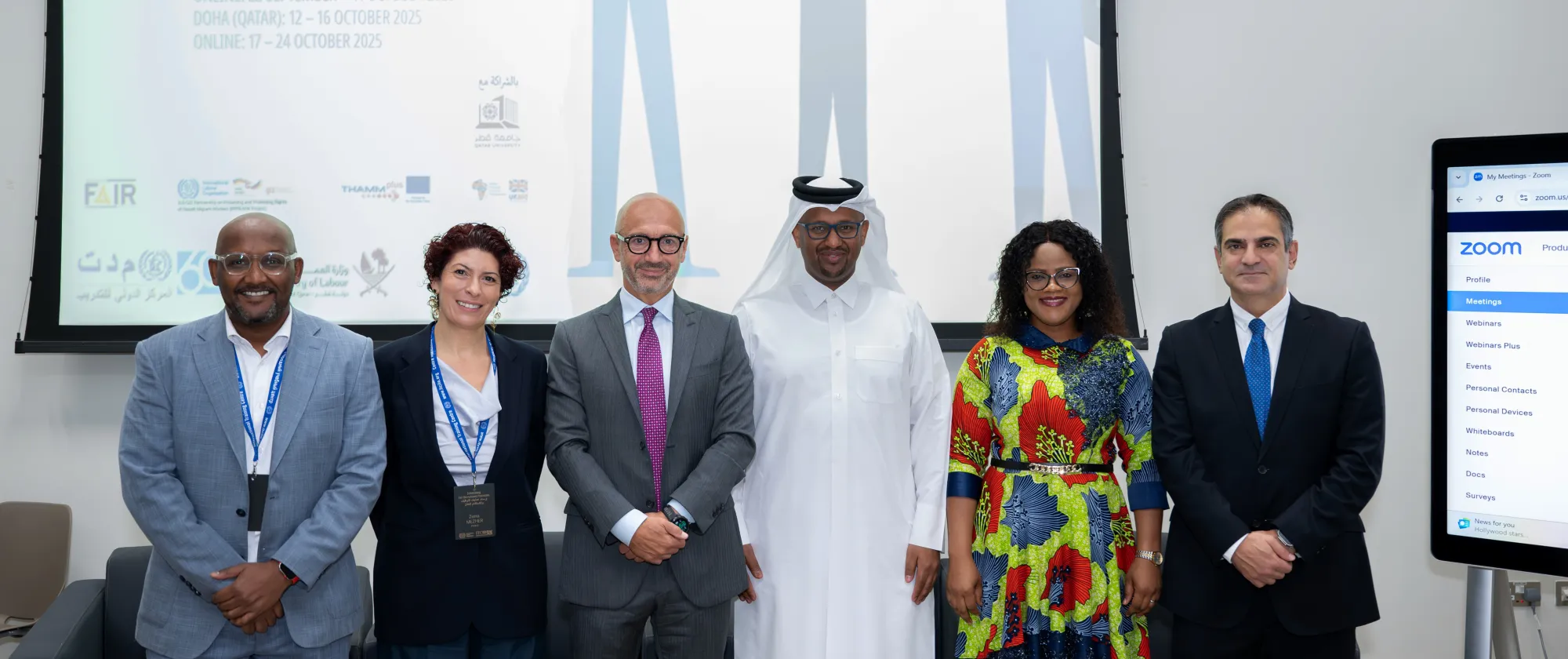ITC-ILO Global training in Doha strengthens action toward fair recruitment and labour rights
Posted at October 28th 2025 12:00 AM | Updated as of October 28th 2025 12:00 AM
Region/Country : Global
|Temas : Fair recruitment
The International Training Centre of the International Labour Organization (ITCILO) has successfully concluded the residential phase of its global training course, “Enhancing Fair Recruitment Processes 2025”, in collaboration with the Ministry of Labour of the State of Qatar and the International Labour Organization’s Country Office in Doha, hosted at Qatar University.
The course brought together 60 participants from more than 20 countries, including representatives of governments, employers, workers’ organizations, recruitment agencies, academia, and technical experts. The residential phase of the course, organized in Doha, in partnership with Qatar University, provided an exceptionally engaging platform for participants to exchange experiences, deepen their understanding, and strengthen action toward fair recruitment systems grounded in labour rights and social justice.
The opening session set the stage for a week of dynamic learning and exchange. The session featured inspiring remarks that emphasized the human dimension and transformative potential of fair recruitment practices, including a human-centred story that illustrated how fair recruitment processes can positively shape workers’ lives. This reflection reinforced the shared vision of making fair recruitment the global standard rather than the exception.
At the outset of the programme, speakers highlighted the strong partnership that made this initiative possible, notably the collaboration between the Ministry of Labour of Qatar, the Government of Ghana, and the International Labour Organization, under the framework of the Fair Recruitment Initiative. This collective effort reflects a shared commitment to promoting fair recruitment practices worldwide.
The opening session brought together distinguished speakers and partners. Mr. Hamad Faraj Dalmouk, Assistant Undersecretary for Migrant Labour Affairs, Ministry of Labour, Qatar (Co-Chair, Fair Recruitment Initiative), opened the session by highlighting the State of Qatar’s commitment to building an integrated labour market characterized by transparency, accountability and justice. Mr. Dalmouk noted that “the Ministry of Labour pays special attention to regulating recruitment and employment processes, ensuring that recruitment is transparent and free of exploitative practices while preserving the rights of all workers and employers.”
Mr. Francesco d’Ovidio, Director of ILO Country Office for the State of Qatar highlighted that fair recruitment is the first step to decent work as it enables individuals to make informed choices to migrate safely seeking decent work abroad. Speaking about the Fair Recruitment Initiative Strategy for 2026–2030, Mr. d’Ovidio noted that this strategy sets a clear path forward, moving from principles and guidance to practical implementation and enforcement, to make fair recruitment a reality for all workers.
Dr. Aiman Erbad, Vice President for Research and Graduate Studies, Qatar University, underlined that “At Qatar University, we believe that change begins with informed and enlightened minds. That is why we are delighted to collaborate with the International Labour Organization and the International Training Center to provide a space for learning, sharing experiences, and building capacity. In these halls, we are not only discussing policies and legal frameworks, but also helping to shape the tools and strategies that will make a real difference in the lives of workers around the world and achieve fair recruitment.”
Ms. Sarah Opokua Asare, Minister-Counsellor and Head of Chancery and Diaspora Affairs, Ghana (Co-Chair, Fair Recruitment Initiative) commended the collaboration between Qatar and Ghana under the ILO Fair Recruitment Initiative Advisory Committee, reaffirming Ghana’s commitment to advancing fair recruitment in line with international labour standards. She highlighted Ghana’s pioneering development of a National Roadmap for Fair Recruitment, grounded in the ILO’s General Principles and Operational Guidelines, as a practical step toward ensuring transparent and accountable recruitment systems.
The session was moderated by Ms. Zeina Mezher, Course Manager at the ITCILO, who framed the discussion within the broader context of international labour standards and fair recruitment principles.
Over five intensive days (October 12–16, 2025), the course explored key dimensions of fair recruitment through interactive sessions, case studies, and a filed visit. Participants examined the role of private recruitment agencies and public employment services in promoting fair recruitment. In addition, human rights due diligence and the prevention of forced labour, access to justice and effective regulatory frameworks, gender and intersectionality, the care economy, data and evidence-based policymaking, and labour inspection and enforcement mechanisms were also explored in detail.
Participants also engaged in practical group work to develop national action plans for fair recruitment, aiming to translate the knowledge and experiences shared during the course into tangible strategies and initiatives in their respective countries.
The course reaffirmed that fair recruitment is not merely a legal or procedural issue, representing a shared commitment to ensure workers’ rights and well-functioning or labour markets, thought social dialogue, as foundation of decent work for all workers.


